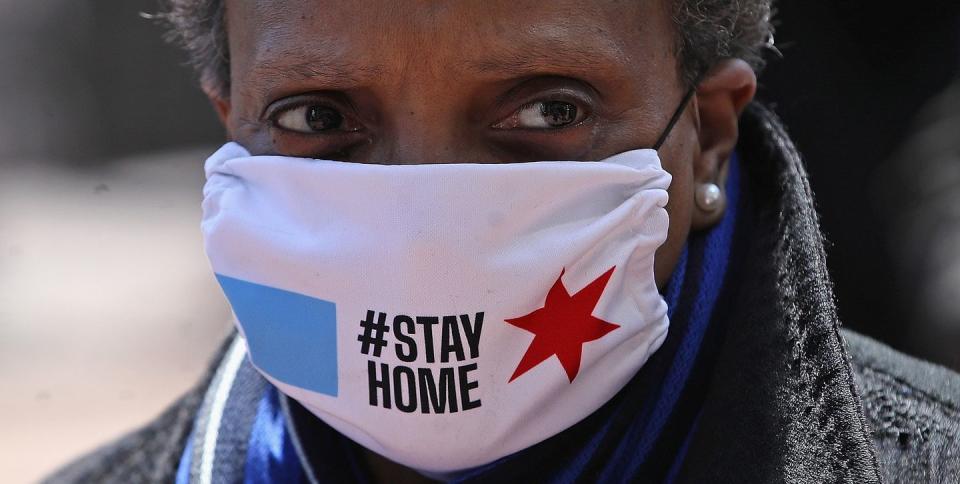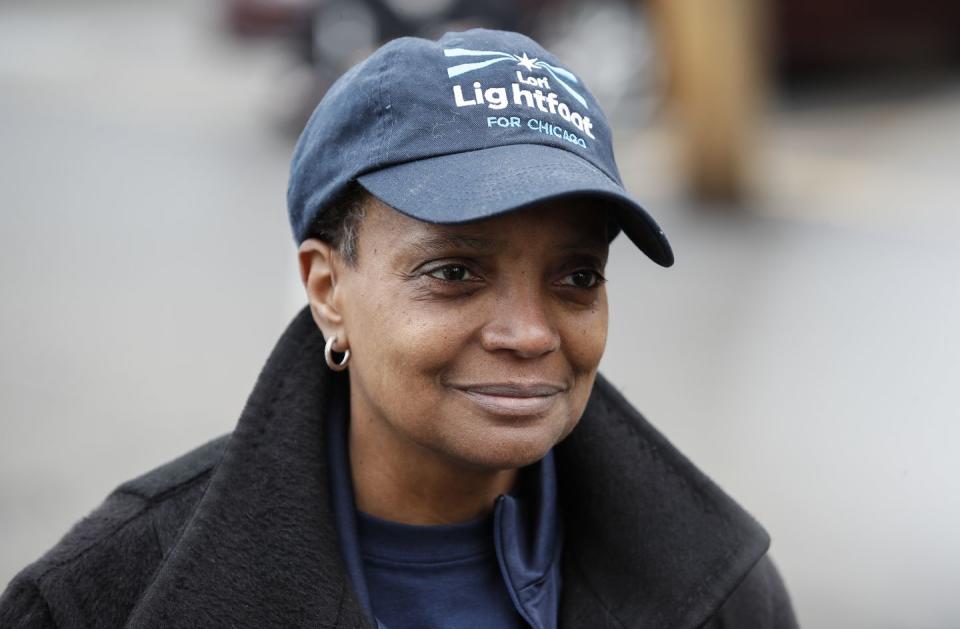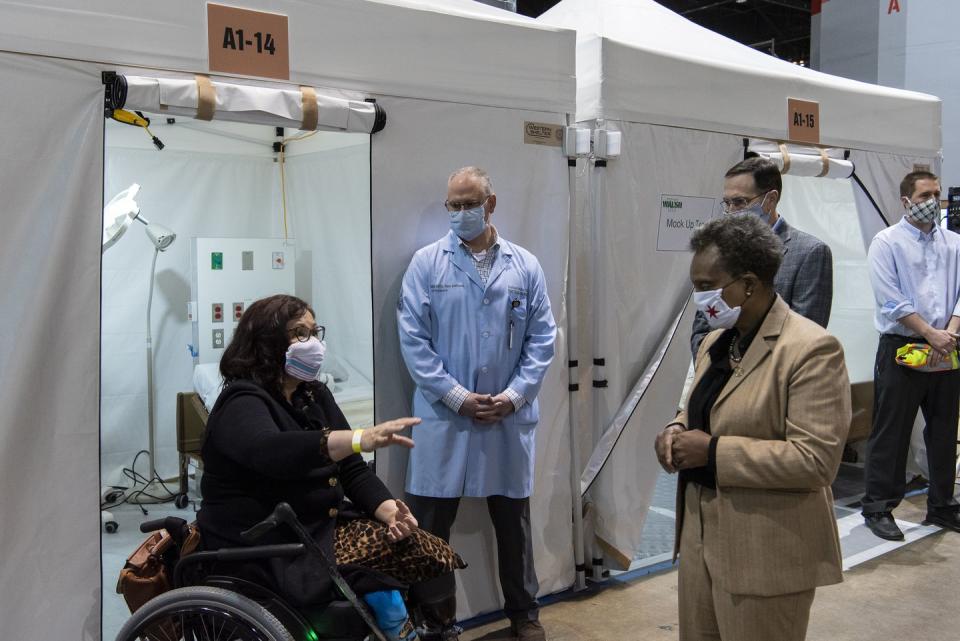Mayor Lori Lightfoot Is More Than Just a Meme

Historically, women have needed to be convinced to enter politics. But since the 2016 presidential election, thousands of women announced their plans to run for public office. And we want them to win. So we're giving them examples of women who have run. The point: You can too.
Chicago Mayor Lori Lightfoot has not been coy about what she wants from her city. The first-term mayor went viral after reprimanding residents for ignoring the state’s stay-at-home order, inspiring a new collection of memes across Twitter and Instagram. The conceit: Lightfoot is everywhere, and she’s watching to make sure you do the right thing. The mayor has responded in kind, posting her own memes, filming a satirical PSA about the importance of staying at home, and making a TikTok to announce a citywide virtual high school graduation. Her TikTok bio? “56th Mayor of Chicago. I don’t play.”
Elected in April 2019, Lightfoot is the first black woman and the first openly gay person to become mayor of Chicago. It's her first time holding elected office, having spent her career working as a prosecutor as well as in city government. Here, she tells ELLE.com why she decided to run and the immense responsibility she feels to be her best self during this pandemic.
I didn't really think of politics as a career path. I grew up in a small town in Ohio. I'm the fourth of my parents’ four children, and my town was fairly segregated growing up. My dad was a janitor for most of his professional life. My mother worked as a nurse's aid. I was fortunate enough to excel in school, and I ended up going to University of Michigan undergrad.
I've always been interested in politics as kind of a spectator sport, but I was never drawn to running myself. Of course, you think about it, but I just felt like it wasn't for me.
Then in 2016, I was leading Chicago's Police Accountability Task Force. There was a pretty horrific killing of a young black man by a white police officer here in Chicago that led to this civil unrest. It unmoored the city. It was an awakening for many people about what was going on in police-community relations and the government's role in that. That year, we also ended up having the highest murder rate that we've had since the mid-1990s.
I started to worry about what was going on. What were the root causes of the violence we were seeing? After digging into that and meeting people across the city who had been working on community violence issues for years, it became clear to me that one of the biggest problems was inequity. Neighborhoods and communities had been neglected for way too long, and as a result, there were high rates of poverty. I was looking to the city and thinking, well surely there's a plan for that. It became clear to me after a lot of inquiry that there wasn't. There wasn't a plan to look to black and brown neighborhoods as a source of strength for the city. There wasn’t a plan to make sure that they were just as vibrant, just as thriving, as the downtown area.
That inquiry and that awakening really occupied me for most of 2016 and 2017. Then people started to raise their hand and say, "I'm going to run for mayor." It became clear to me over time that [former mayor] Rahm Emanuel just simply could not get a third term. Families and individuals who look like me and grew up in circumstances like mine—low income, struggling, living paycheck to paycheck—would be left even further behind.

People who were stepping up to run against him weren't talking about those issues either. I'd exhausted every other route. I’d gone to other people who had much bigger platforms than me, who really had the ability to influence the current mayor and said, "You got to step up. You got to speak out.” They just weren't willing to do it. It was plain and simple
That's when I really started thinking, "Well what about me? What would that look like? What would that require?" I was not naive about the task of taking on a two-term incumbent who had potentially unlimited amounts of money. But I just knew that I had to step up. This was a moment, and if I didn't, I would probably regret it for the rest of my life.
Planning for a pandemic and the response wasn't in the playbook. That's a level of crisis that no one really can prepare for.
Our priorities were making sure the healthcare system didn't buckle. We needed to make sure our healthcare workers had the support they needed to be able to be on the front lines for 12-14 hours every day, seven days a week.
Then thinking about our first responders, making sure we were taking care of them. We also had to think about our most vulnerable residents: The homeless, people with underlying medical conditions, our seniors. What were their needs, and how did we respond to their needs?
We knew that there were health disparities. We knew that there were life expectancy disparities, and we were starting to work on how we meet those challenges. We have a program that we were about to roll out, right before the pandemic hit, called Healthy Chicago 2025. The pandemic has made us accelerate all of those plans. I told my team, "I don't want to build temporary scaffolding. I want to build rock-solid foundations on which we can build going into the future." The crisis has demanded that we think more boldly and more quickly.
You've got to reach people where they are. You've got to think about what's the best way to communicate effectively. TikTok is something that my 12-year-old does. I had no knowledge of it before. But what we've learned through this is that you can't take a one-size-fits-all approach to engagement. We've had a lot of challenges with black youth. How do we press upon them the urgency of the moment? We need to make sure they understand that this is about them. It concerns them. There’s also our Latinx community. We're seeing a significant uptick in the number of cases there. What's the credible message, and who are the credible messengers, so we can reach that community effectively to talk about what they can do to help protect themselves.
The memes happened organically. There was an Instagram account called @WheresLightfoot that started with a few images after I closed down the lakefront. It just took off. It’s an incredible testament to the ingenuity and the spirit of creativity here in Chicago. I've seen images of myself literally everywhere: Inside a refrigerator saying, "You just ate”; on tops of buildings and iconic structures here in Chicago. I've had a tremendous amount of fun with it, and they keep coming. They’re moments of levity and engage people who are so ready to be out and about in beautiful Chicago.
For me, it helps to have a really good, hard-working, dedicated team during this time. We've been working close to 50 days straight. That takes a toll on you. You've got to find those moments where you can exhale and lay down the burdens of the day. They're still going to be there, but you got to lay them down for a moment, catch your breath, and take a rest so you can move forward.
But the larger issue of mental health and trauma is absolutely ever-present. Because of violence and sexual assault in our city, we have a lot of people that were suffering before this pandemic. We know that there's a need out there. We need to make sure people know where they can go to get help, and that it's okay not to feel okay.

What I know is that in the middle of a crisis, you can't be focused on the politics. If that becomes a guiding principle, you're going to focus on the wrong things. You're going to make decisions for the wrong reasons. I have to be guided by saving peoples' lives, informed by the science and the data. If I focus on the politics, I'm going to be lost. And if I'm lost, my city's lost. I can't afford for that to happen. I see it happening with other people. I'm determined it's not going to happen with me.
It doesn't mean you can rid yourself of the politics, but what I've tried to do with my own leadership—and I'm trying to press other people to do the same—is rise to the moment. Rise above the pettiness and the bickering that might inform our day-to-day. Peoples' lives are at stake.
Recently, I was out at a church down on the far southeast corner of the city. It’s a pretty tough area. It used to be a steel town, but steel mills have long since gone away. People are struggling, and they're hurting. When I look into the eyes of people who are humbly coming to pick up what may be not just their day's food, but their days’ food, I know in that moment that I have to be my best self.
This interview has been edited and condensed for clarity.

You Might Also Like

 money
money 